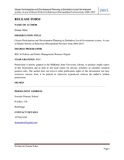Please use this identifier to cite or link to this item:
https://cris.library.msu.ac.zw//handle/11408/2697| Title: | Citizen participation and development planning in Zimbabwe local government system: a case of Khami District in Bulawayo Metropolitan Province from 2004-2015. | Authors: | Ndou, Donate | Keywords: | Citizen participation Development Administrative |
Issue Date: | 2015 | Publisher: | Midlands State University | Abstract: | The subject of citizen participation has been a bone of both administrative and development contention and it is believed that if the participation is effective, development attempts will as well be successful. When Zimbabwe gained independence in 1980, the Government paid much attention in trying to revive the Local Government system in an attempt to redress the unfairness of the colonial Local Government system through formulating legislations and structures that facilitate grassroots participation. These include among others the 1984 Prime Minister’s Directive that was implemented through the Provincial Councils and Administrative Act; the Urban Councils Act; the Rural District Councils Act and the Traditional Leaders Act. With these legislations and structures on paper, local authorities are still ineffective and inefficient in initiating and advancing development activities most probably because of lack of formal structures. Khami district is used to investigate the failures of local authorities in their development attempts by determining whether formal structures are useful in development planning. The objectives of this study are to assess the impact of using resident associations as participatory structures; to determine the usefulness and effectiveness of VIDCO/NEDCO/WADCO structures in coming up with plans that are relevant to local needs; to understand if formal structures are important in facilitating citizen participation in development planning and to find out whether the establishment of such structures can improve citizen participation in Bulawayo as a whole. The research adopted a qualitative research methodology and a descriptive design. Interviews and questionnaires were used as research instruments to collect data targeting 10% of the 18 450 total population of Khami district. The research findings reaffirmed that the failures of local authorities in advancing development activities is due to their reliance on politicised civil society organisations as participatory structures. Also, the research established that formal structures that has been introduced in Khami district has been quite successful and as such they are useful, effective and necessary in facilitating citizen participation in development planning. According to the research findings it is possible for such structures to change the face of development in Bulawayo as a whole. The researcher recommended the need to amend the Urban Councils Act to make a provision for participatory structures in urban local authorities or to harmonise the Urban Councils Act and the Rural District Councils Act. Other suggestions made are the need to revive participatory structures in Rural District Councils and the need for local authorities and development agencies to adopt a bottom up fashion in planning in order to make the above mentioned recommendations feasible. There is also need to examine factors that led to failures of participatory structures in Rural District Councils soon after their establishment in the mid-1980s so as to avoid repeating the same mistakes and to investigate the factors that have led to effective participation in other countries so as to adopt the same measures and improve the Zimbabwean Local Government system | URI: | http://hdl.handle.net/11408/2697 |
| Appears in Collections: | Bachelor Of Science In Politics And Public Management Honours Degree |
Files in This Item:
| File | Description | Size | Format | |
|---|---|---|---|---|
| donateeee final.pdf | Full Text | 1.38 MB | Adobe PDF |  View/Open |
Page view(s)
110
checked on Apr 19, 2025
Download(s)
564
checked on Apr 19, 2025
Google ScholarTM
Check
Items in MSUIR are protected by copyright, with all rights reserved, unless otherwise indicated.



